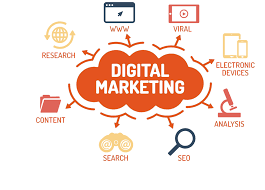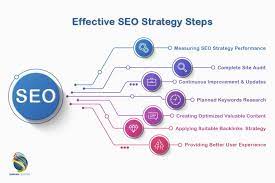The Power of Web Marketing and SEO
In today’s digital age, web marketing and Search Engine Optimization (SEO) play a crucial role in the success of any online business. Web marketing encompasses a range of strategies aimed at promoting products or services on the internet, while SEO focuses on optimizing a website to rank higher in search engine results.
Effective web marketing involves various techniques such as social media marketing, email marketing, content marketing, and pay-per-click advertising. These strategies help businesses reach their target audience, increase brand awareness, and drive traffic to their websites.
SEO is essential for improving a website’s visibility in search engines like Google. By optimizing website content, meta tags, images, and other elements according to search engine algorithms, businesses can improve their organic search rankings and attract more organic traffic.
When web marketing and SEO are combined effectively, they can have a significant impact on a business’s online presence. A well-executed web marketing campaign supported by strong SEO practices can result in increased website traffic, higher conversion rates, and improved brand credibility.
It’s important for businesses to stay updated on the latest trends and best practices in web marketing and SEO to remain competitive in the digital landscape. By investing time and resources into these strategies, businesses can position themselves for long-term success online.
Overall, web marketing and SEO are powerful tools that can help businesses expand their reach, connect with their target audience, and achieve their online goals. By harnessing the power of these strategies effectively, businesses can stay ahead of the curve in an increasingly competitive online market.
Top 6 FAQs About Web Marketing and SEO: Boost Your Online Presence and Avoid Common Pitfalls
- What is web marketing and how does it differ from traditional marketing?
- Why is SEO important for my website?
- How can social media marketing benefit my business’s online presence?
- What are the key elements of a successful SEO strategy?
- How can content marketing help improve my website’s search engine rankings?
- What are some common pitfalls to avoid in web marketing and SEO?
What is web marketing and how does it differ from traditional marketing?
Web marketing is a digital marketing strategy that focuses on promoting products or services through online channels such as websites, social media, email, and search engines. It utilizes various techniques to reach a target audience, increase brand visibility, and drive traffic to websites. Unlike traditional marketing, which relies on offline methods like print ads, TV commercials, and direct mail, web marketing leverages the power of the internet to connect with consumers in real-time and on a global scale. Web marketing offers businesses the ability to track and analyze data more effectively, target specific demographics with precision, and engage with customers in interactive ways that traditional marketing cannot replicate. Ultimately, web marketing provides a more cost-effective and measurable approach to reaching and engaging audiences compared to traditional marketing methods.
Why is SEO important for my website?
SEO, or Search Engine Optimization, is crucial for your website because it helps improve your website’s visibility in search engine results. When potential customers search for products or services related to your business, a strong SEO strategy ensures that your website appears higher in search rankings, increasing the likelihood of attracting organic traffic. By optimizing your website’s content and structure according to SEO best practices, you not only enhance user experience but also establish credibility with search engines like Google. Ultimately, investing in SEO helps drive targeted traffic to your website, improves brand visibility, and boosts overall online presence, leading to increased opportunities for conversions and business growth.
How can social media marketing benefit my business’s online presence?
Social media marketing can greatly benefit your business’s online presence by providing a platform to connect with your target audience, increase brand visibility, and drive traffic to your website. By leveraging popular social media platforms such as Facebook, Instagram, Twitter, and LinkedIn, businesses can engage with their customers in real-time, share valuable content, and build a loyal following. Social media marketing also allows businesses to run targeted advertising campaigns to reach specific demographics and increase brand awareness. Additionally, social media signals can positively impact SEO efforts by driving more traffic to your website and improving its overall visibility in search engine results. Overall, integrating social media marketing into your digital strategy can help boost your online presence and establish a strong brand identity in the competitive online landscape.
What are the key elements of a successful SEO strategy?
When it comes to crafting a successful SEO strategy, several key elements are essential for achieving optimal results. First and foremost, thorough keyword research is crucial to identify relevant search terms that align with your target audience’s intent. Creating high-quality, engaging content that incorporates these keywords naturally is another critical element. Additionally, optimizing on-page elements such as meta tags, headings, and image alt text can improve a website’s search engine visibility. Off-page factors like building quality backlinks from reputable sources also play a significant role in boosting SEO performance. Regular monitoring and analysis of performance metrics to track progress and make data-driven adjustments are vital components of a successful SEO strategy that ultimately leads to improved search rankings and increased organic traffic.
How can content marketing help improve my website’s search engine rankings?
Content marketing plays a pivotal role in enhancing a website’s search engine rankings by providing valuable, relevant, and engaging content that attracts and retains visitors. Search engines like Google prioritize websites that offer high-quality content that aligns with user intent. By creating informative articles, blog posts, videos, infographics, and other types of content optimized with relevant keywords and structured data, businesses can improve their website’s visibility in search results. Content marketing not only helps drive organic traffic to the website but also establishes authority and credibility in the industry, signaling to search engines that the site is a reliable source of information worth ranking higher.
What are some common pitfalls to avoid in web marketing and SEO?
When it comes to web marketing and SEO, there are several common pitfalls that businesses should avoid to ensure the success of their online efforts. One common mistake is neglecting the importance of quality content. Content plays a crucial role in SEO, and businesses should focus on creating relevant, engaging, and original content to attract both search engines and users. Another pitfall is ignoring the technical aspects of SEO, such as optimizing website speed, mobile-friendliness, and site structure. Failure to address these technical issues can hinder a website’s performance in search engine rankings. Additionally, overlooking the significance of regular monitoring and analysis of web marketing campaigns can lead to missed opportunities for improvement. By staying vigilant and addressing these pitfalls proactively, businesses can enhance their web marketing and SEO strategies for better results.




